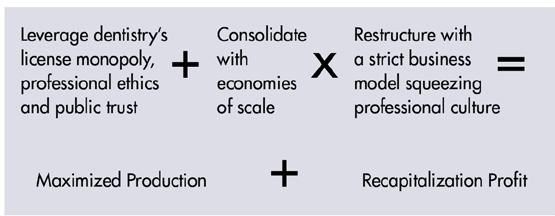
8 minute read
Editorial
All Golden Parachutes that Glitter are not Gold
Dental practice owners who pull the ripcord of their retirement parachute in selling their practices to private equity-funded companies must protect themselves from personal risk and dentistry from threats to its status as a profession.
You won! You received a lucrative financial compensation proposal to sell your dental practice and descend safely into retirement with your golden parachute. But wait! What seems too good to be true, may actually be too good to be true.
Your advisors warn you that selling your life’s work to the wrong private equity-backed dental support organization poses hidden financial risks and uncertainty regarding your rights and duties post-closing. You quickly realize that selling to an investor-funded management company rather than another dentist will dramatically complicate the transition process. When dental practice owners sell their practices to investor-backed management groups, these sellers should perform extensive due diligence regarding the purchase price and payment terms, the working relationship with the buyer after the sale and the sustainability of the business model to prevent the seller’s, and if left unchecked, the dental profession’s crash landing.
Investor-Owned Company Buyer v. Practitioner Buyer
The investor-owned company buyer purchases a target practice with the intent to gain a profitable return on the investment through recapitalization, sale or “flip” in three to five years. These investors employ the financial concept equity arbitrage, where they buy practices with annual revenues of more than $1.5 million in the traditional private practice market, combine the equities of the target practices into a much larger enterprise, then sell in the conglomerate market for an enterprise value of two- to five-times the purchase prices of the target practices within a typical five-year private equity investment cycle.[1] The possibility of this high return to the investors enables them to offer premium purchase prices to practitioner sellers.
Investor buyers entice private dentists to sell their practices to the company, with purchase price offers of between 20% to 100% more than practitioner buyers can offer. Investors calculate the value of the target practice utilizing multiples of Earnings Before Interest, Taxes, Depreciation and Amortization (EBITDA), a valuation metric utilized in large corporate acquisitions but not historically associated with dental practices, especially smaller practices. EBITDA-based valuations typically fall in the range of 100% to 150% of the target’s annual revenue.[2] However, the financial windfall to the seller of an apparently inflated purchase price comes with a payment structure that transfers the risk of getting paid the full purchase price to the seller.
Conversely, the practitioner buyer purchases a target practice primarily to earn an income treating patients over a longer time. Practitioner buyers without private equity funds must borrow the purchase money frombanks and similar lenders, who limit purchase loans to the amount the practitioners can afford to repay through owning and operating the practice, thereby establishing a ceiling on the purchase price for practitioner buyers. Hence, practitioner-to-practitioner transfers of smaller practices are valued in the range of 65% to 85% of annual revenues, approximately half of investor-buyer EBITDA values.[3] However, although dentists who sell to dentists may receive comparatively less for their practices, they typically receive, without contingencies, 100% of the purchase price in cash at closing.
Company buyers transfer the financial risk of part of the payment of the purchase price to the seller through variations in the deal structure. First, the seller may receive only 60% to 85% of the purchase price in cash at closing. Second, the purchase agreement may mandate an earnout for the seller, making a significant percentage of the remaining purchase price contingent upon the seller dentist working in the practice for two to five years and reaching revenue benchmarks. Third, the buyer may offer the seller the remainder of the purchase price in the form of an ownership interest in the investor buyer’s company.
Failure of the seller to meet production goals results in failure to receive the full purchase price. Failure of the company to timely recapitalize at the expected profit leaves the seller with a diluted equity position in the ownership interest, an unmarketable asset and, again, failure to receive the remainder of their purchase price. In the process, these minority equity owners possess little control over management and transactional decisions that can lead to post-closing disputes, especially when sellers do not get paid in full.
Ultimately, investor-owned companies offer to pay more for dental practices than practitioner buyers to entice hardworking dentist sellers to share the financial risk of getting paid the premium price and to endure the upheaval of working in the company practice restructured to generate the profit that, in part, funds the deal. Sellers must obtain an accurate practice appraisal, understand the risk of the company failing to recapitalize for the enterprise value and determine whether the company has sufficient capital to finance the deal.
The Consolidation Restructuring Squeeze Company buyers strategize to leverage the dental practice industry’s strengths and, concomitantly, fix the weaknesses of the oral healthcare delivery system to elevate practice profit above all other metrics. Investor-owned practices use dentistry’s strengths of a professional license monopoly, the ethical commitment of the majority of dentists and resultant public trust in the profession as a base to withstand the potential deleterious effects of forcing its profitdriven business plans upon professional oral healthcare service entities.
Nondentist investors bet on these intangible assets of the dental profession, not commonly found in other enterprises, to increase the likelihood of turning a profit. First, since only dentists can practice dentistry, this license monopoly will, to a significant extent, limit competition for whatever level of dental services the company provides. Second, most dentist employees will ethically act in the best interests of patients and do the right thing regardless of profit-driven compensation incentives, revenue-oriented patient scheduling and production quotas that may otherwise foster reduced quality.[4] Third, the public will maintain its faith in the dental profession as the leading authority in oral healthcare due to dentistry’s long history of dedicated service, despite the company’s unabashed commitment to the bottom line.
Management companies apply the economies of scale to fix the historically fragmented and poorly managed dental industry. They consolidate numerous small private dental practices into massive multi-location conglomerates to spread costs over a greater volume with increased efficiency. Economies of scale reduce per service overhead costs and allow the owners to negotiate reduced equipment, supply and lab costs, and increased third-party reimbursements.
The consolidation restructuring squeeze equation may look as follows:

Not all private equity-backed management groups are created equal. While consolidating dentistry’s fragmented and inefficient delivery system with economies of scale is an overdue and positive step, exploiting and dissipating dentistry’s strengths for short-term investor gains weakens dentistry’s status as a profession committed to the best interests of the patient. Hence, sellers must perform due diligence to learn the company’s culture and practice philosophy in the company’s current business model. Sellers who will work in the practice after the sale should know the infrastructure in which the seller will practice, along with the level of control the seller employee will have over policies affecting clinical decision-making.
Turbulent Future of Golden Parachutes
The high-flying equity arbitrage of dental practices, as is true of any commodity traded in this manner, can only exist for brief periods. Private equity buyers will exhaust the inventory of available practices that fit their business plan; purchase prices will begin to equalize between markets; and management companies will become less involved because, despite overaggressive profit-driven policies, dentistry’s profit margin remains too small to support their added management layers. Only the questions of how many seller golden parachutes will crash and whether dentistry can survive as a profession remain.
Practicing dentists must quickly figure out how to better manage our own practices and apply economies of scale without abdicating our ethical and professional responsibilities. In the meantime, dentist sellers must protect themselves from personal risks with exhaustive due diligence of company buyers. Importantly, sellers must refuse to sell to any buyer that will exploit our professional culture for profit at the expense of our professional integrity.

REFERENCES
1. Francis K. Equity Arbitrage: The literal million-dollar difference in the sale of your dental practice. Dental Economics, 2022. https://www.dentaleconomics.com/money/ article/14280329/equity-arbitrage-the-literal-million-dollar-difference-in-the-sale-of-yourdental-practice.
2. Anderson M. The DSO industry is brimming with private equity money, leading to concerns over patient safety. Healthcare-Brew.com, 2023. https://www.healthcare-brew.com/ stories/2023/06/02/the-dso-industry-is-brimming-with-private-equity-money-leading-toconcerns-over-patient-safety.
3. McLerran + Associates. Dental Industry Trends & DSO Buyers: How current trends are leading to the consolidation of the dental industry & What you need to know about DSO buyers. The Dental Transition Newsletter, Spring/Summer 2019. https://dentaltransitions.com/wpcontent/uploads/2015/11/McLerran_6-page_Summer_2019_newsletter-for-web.pdf.
4. Anderson M. The DSO industry is brimming with private equity money, leading to concerns over patient safety. Healthcare-Brew.com, 2023. https://www.healthcare-brew.com/ stories/2023/06/02/the-dso-industry-is-brimming-with-private-equity-money-leading-toconcerns-over-patient-safety.










